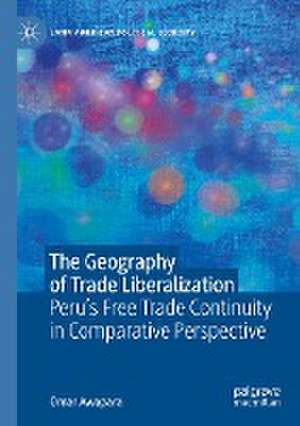The Geography of Trade Liberalization: Peru’s Free Trade Continuity in Comparative Perspective: Latin American Political Economy
Autor Omar Awaparaen Limba Engleză Paperback – 3 ian 2024
| Toate formatele și edițiile | Preț | Express |
|---|---|---|
| Paperback (1) | 777.69 lei 6-8 săpt. | |
| Springer International Publishing – 3 ian 2024 | 777.69 lei 6-8 săpt. | |
| Hardback (1) | 782.72 lei 6-8 săpt. | |
| Springer International Publishing – 2 ian 2023 | 782.72 lei 6-8 săpt. |
Preț: 777.69 lei
Preț vechi: 948.40 lei
-18% Nou
Puncte Express: 1167
Preț estimativ în valută:
148.81€ • 155.69$ • 123.62£
148.81€ • 155.69$ • 123.62£
Carte tipărită la comandă
Livrare economică 03-17 aprilie
Preluare comenzi: 021 569.72.76
Specificații
ISBN-13: 9783031234224
ISBN-10: 3031234227
Pagini: 244
Ilustrații: XVI, 244 p. 3 illus.
Dimensiuni: 148 x 210 mm
Greutate: 0.32 kg
Ediția:1st ed. 2023
Editura: Springer International Publishing
Colecția Palgrave Macmillan
Seria Latin American Political Economy
Locul publicării:Cham, Switzerland
ISBN-10: 3031234227
Pagini: 244
Ilustrații: XVI, 244 p. 3 illus.
Dimensiuni: 148 x 210 mm
Greutate: 0.32 kg
Ediția:1st ed. 2023
Editura: Springer International Publishing
Colecția Palgrave Macmillan
Seria Latin American Political Economy
Locul publicării:Cham, Switzerland
Cuprins
1. Introduction.- 2. A Geography-Based Theory of Trade Policy.- 3. The Regional Impact of Free Trade: An Empirical Analysis.- 4. Trade-related protests in post reform Latin America.- 5. Geography and Trade Reform in Latin America.- 6. Conclusions.
Notă biografică
Omar Awapara is Director of Political Science at UPC (Universidad Peruana de Ciencias Aplicadas) and Global Instructor at the University of Arizona, the USA.
Textul de pe ultima copertă
This book answers why anti-trade forces in developing countries sometimes fail to effectively exert pressure on their governments. The backlash against globalization spread across several Latin American countries in the 2000s, yet a few countries such as Peru doubled down on their bets on free trade by signing bilateral agreements with the US and the EU. This study uses evidence from three Latin American countries (Peru, Argentina, and Bolivia) to suggest that geography can play a significant role in shaping trade preferences and undermining the formation and clout of distributional coalitions that seek protectionism. Because trade liberalization can have uneven distributional impacts along regional lines, trade liberalization losers can find themselves in unfavorable conditions to associate and engage in collective action. Under these circumstances, few coalitions emerge to battle for protection in the policy arena, and when they do, geographic distance from decision-makers in the capital city can be a significant barrier to realizing their interests. As a result, even where a majority of the population living in regions that have not benefitted from trade elect a leftist president, trade reform reversal will not occur unless protectionist interests are close to the capital city. The contrast between Peru, on one side, and Argentina and Bolivia, on the other, highlights the powerful influence geography can have on reversing trade policy or preserving the status quo.
Omar Awapara is Director of Political Science at UPC (Universidad Peruana de Ciencias Aplicadas) and Global Instructor at the University of Arizona, the USA.
Caracteristici
Answers why anti-trade forces in developing countries sometimes fail to effectively exert pressure on their governments Uses evidence from three Latin American countries Written by Omar Awapara Franco














